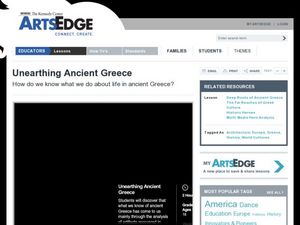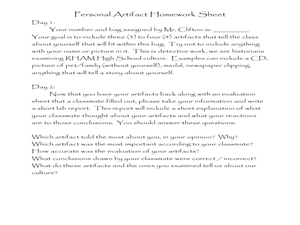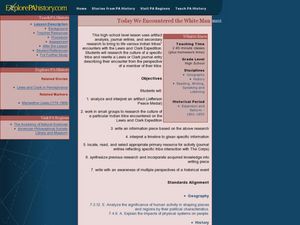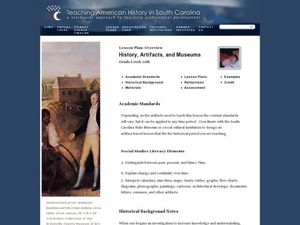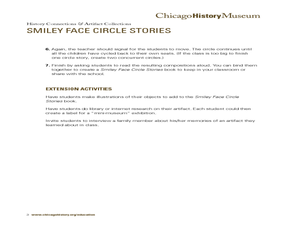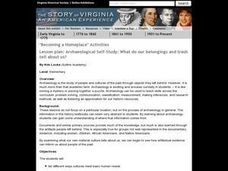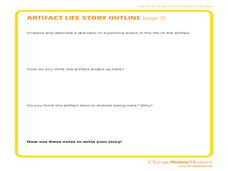Curated OER
Unearthing Ancient Greece
Learners locate and analyze clues about ancient Greek life. In this ancient Greece lesson, students look at art, architecture, and artifacts to determine what was important to the Greeks and discover details about their culture. Learners...
Curated OER
Ancient Artifacts
Students research the earliest Americans. In this ancient civilizations lesson, students investigate the Mayas, Aztecs, and Incas. Students examine artifacts used in the cultures and then determine what the artifacts were used for and...
Curated OER
Personal Artifacts
Ninth graders put their observation skills to work. In this observation skills lesson, 9th graders examine personal artifacts that their instructor has gathered. Students take notes on the artifacts they analyze and write lab reports...
Curated OER
For the Last 10,000 Years...
Young scholars study the National Estuarine Research Reserve System and discuss why they have important cultural artifacts. In this estuarine weather lesson students use the Internet and complete a worksheet.
Curated OER
Worksheet for Analysis of an Artifact
For this primary source analysis worksheet, students respond to 20 short answer questions that require them to analyze an artifact of their choice.
Curated OER
The Iron Cheesebox
Students describe the oxidation/reduction reactions that are involved in the corrosion of iron in seawater. In this marine sanctuary lesson students study the steps in conserving marine archaeological artifacts.
Curated OER
Moving Objects
Students discover the history of the United States by examining the Great Migration. In this U.S. History lesson plan, students research the immigration movement on the Internet and complete a worksheet about the large population...
Curated OER
Stampin' Around Chicago
Students discuss the United States Postal Service and choose an artifact from one decade. In this art lesson plan, students research how the artifact chosen relates to Chicago and the United States. Students create their own postage...
Curated OER
Today We Encountered the White Man
Students analyze and interpret artifacts and a timeline to get specific information. In this timeline lesson plan students work in groups to research an Indian tribe and write an information piece of their research.
Curated OER
An Exercise in Seriation Dating
Students study the different types of artifacts found that were made by the colonial people. In this archaeology lesson students take part in finding ceramic and charting their results.
Curated OER
Everyone has Interesting Stuff
Students examine a random collection of artifacts. In this deductive reasoning and cultural awareness lesson, students will pair up and examine a given artifact. Each student will attempt to use the artifact's attributes and apparent...
Curated OER
Shipwreck Mystery
Students study web pages on a shipwreck then locate where this took place on a map. In this marine archaeologist lesson students examine what clues archaeologists use to find the location of a shipwreck and what they might find.
Curated OER
The ABC's of Artifacts
Students create their own ABC book about artifacts. In this artifact lesson, students read ABC History Mystery and review the artifacts pictured in the book. They create their own ABC book with each student working on a letter.
Curated OER
History, Artifacts, and Museums
Eleventh graders interpret historical evidence presented in primary and secondary resources. In this historical artifacts lesson, 11th graders select and research historical topics that require them to interpret calendars, timelines,...
Curated OER
Traveler's Trunk
Students analyze and interpret artifacts from the 1920s and explore the Great Migration. In this 1920s history instructional activity, students review background information about the Great Migration and use artifacts to study history of...
Curated OER
Smiley Face Circle Stories
Students examine different artifacts from the 1970's. In this history lesson, students discover what each artifact is by seeing the artifact and reading a card defining what the artifact represents. On the second day, students create...
Curated OER
Time in a Teakettle
Students compare and contrast the development of teakettles. In this artifacts lesson, students divide into groups and examine different teakettles. Students complete an artifact analysis worksheet, draw a picture of their kettle and...
Curated OER
Archaeological Self-Study: What Do Our Belongings and Trash Tell About Us?
Students examine how their belongings and their trash represents who they are. In this archaeology skills lesson, students watch a video titled "Discovering the Past" and then give archaeological techniques a try. Students examine and...
Curated OER
Life Story of an Artifact
Young scholars write about an artifact that they are studying. For this artifacts lesson plan, students analyze details of the artifact and answer short answer questions about it.
Curated OER
History at Home: The Object Box
Students examine "artifacts". In this anthropology lesson, students analyze possible uses for objects such as washboards, hot water bottles, and old magazines. Students record and share their speculations with their classmates.
Curated OER
Archaeology and History
In this archaeology worksheet, students draw the given chart into a folder and copy the given points. Students then write the missing word 'historians' or 'archaeologist' for the sentences. Students visit an interactive timeline website...
Curated OER
Mysteries of Egypt
Learners investigate the Egyptian civilization. For this cultural lesson, students watch the film Mysteries of Egypt and create a replica of an ancient Egyptian artifact.
Curated OER
Reconstructing Artifacts
Students investigate artifacts and reconstruct them. In this artifact lesson, students research archaeologists and Native American groups. Students plan a design for a clay pot which represent the Native American artifact.
Curated OER
Written Clues About the Past
Third graders investigate written clues from the past. In this clues from the past lessons, 3rd graders read and entry called, "Rick's Backyard Site." They complete the associated resource sheets. They read about a second site and use a...
